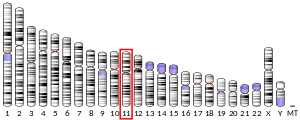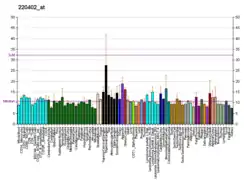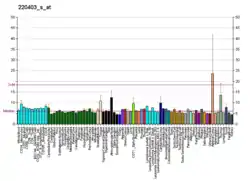| TP53AIP1 | |||||||||||||||||||||||||||||||||||||||||||||||||||
|---|---|---|---|---|---|---|---|---|---|---|---|---|---|---|---|---|---|---|---|---|---|---|---|---|---|---|---|---|---|---|---|---|---|---|---|---|---|---|---|---|---|---|---|---|---|---|---|---|---|---|---|
| Identifiers | |||||||||||||||||||||||||||||||||||||||||||||||||||
| Aliases | TP53AIP1, P53AIP1, tumor protein p53 regulated apoptosis inducing protein 1 | ||||||||||||||||||||||||||||||||||||||||||||||||||
| External IDs | OMIM: 605426 HomoloGene: 137360 GeneCards: TP53AIP1 | ||||||||||||||||||||||||||||||||||||||||||||||||||
| |||||||||||||||||||||||||||||||||||||||||||||||||||
| |||||||||||||||||||||||||||||||||||||||||||||||||||
| |||||||||||||||||||||||||||||||||||||||||||||||||||
| |||||||||||||||||||||||||||||||||||||||||||||||||||
| Wikidata | |||||||||||||||||||||||||||||||||||||||||||||||||||
| |||||||||||||||||||||||||||||||||||||||||||||||||||
p53-regulated apoptosis-inducing protein 1 is a protein that in humans is encoded by the TP53AIP1 gene.[3][4][5]
References
- 1 2 3 GRCh38: Ensembl release 89: ENSG00000120471 - Ensembl, May 2017
- ↑ "Human PubMed Reference:". National Center for Biotechnology Information, U.S. National Library of Medicine.
- ↑ Oda K, Arakawa H, Tanaka T, Matsuda K, Tanikawa C, Mori T, Nishimori H, Tamai K, Tokino T, Nakamura Y, Taya Y (Oct 2000). "p53AIP1, a potential mediator of p53-dependent apoptosis, and its regulation by Ser-46-phosphorylated p53". Cell. 102 (6): 849–62. doi:10.1016/S0092-8674(00)00073-8. PMID 11030628. S2CID 3051667.
- ↑ Matsuda K, Yoshida K, Taya Y, Nakamura K, Nakamura Y, Arakawa H (May 2002). "p53AIP1 regulates the mitochondrial apoptotic pathway". Cancer Res. 62 (10): 2883–9. PMID 12019168.
- ↑ "Entrez Gene: P53AIP1 p53-regulated apoptosis-inducing protein 1".
Further reading
- Strano S, Monti O, Pediconi N, et al. (2005). "The transcriptional coactivator Yes-associated protein drives p73 gene-target specificity in response to DNA Damage". Mol. Cell. 18 (4): 447–59. doi:10.1016/j.molcel.2005.04.008. PMID 15893728.
- Wesierska-Gadek J, Gueorguieva M, Horky M (2005). "Roscovitine-induced up-regulation of p53AIP1 protein precedes the onset of apoptosis in human MCF-7 breast cancer cells". Mol. Cancer Ther. 4 (1): 113–24. doi:10.1158/1535-7163.113.4.1. PMID 15657359.
- Chan KT, Lung ML (2004). "Mutant p53 expression enhances drug resistance in a hepatocellular carcinoma cell line". Cancer Chemother. Pharmacol. 53 (6): 519–26. doi:10.1007/s00280-004-0767-4. PMID 15004724. S2CID 13125987.
- Kövesi G, Szende B (2004). "Changes in apoptosis and mitotic index, p53 and Ki67 expression in various types of oral leukoplakia". Oncology. 65 (4): 331–6. doi:10.1159/000074646. PMID 14707453. S2CID 19136670.
- Strausberg RL, Feingold EA, Grouse LH, et al. (2003). "Generation and initial analysis of more than 15,000 full-length human and mouse cDNA sequences". Proc. Natl. Acad. Sci. U.S.A. 99 (26): 16899–903. Bibcode:2002PNAS...9916899M. doi:10.1073/pnas.242603899. PMC 139241. PMID 12477932.
- Venter JC, Adams MD, Myers EW, et al. (2001). "The sequence of the human genome". Science. 291 (5507): 1304–51. Bibcode:2001Sci...291.1304V. doi:10.1126/science.1058040. PMID 11181995.
This article is issued from Wikipedia. The text is licensed under Creative Commons - Attribution - Sharealike. Additional terms may apply for the media files.



